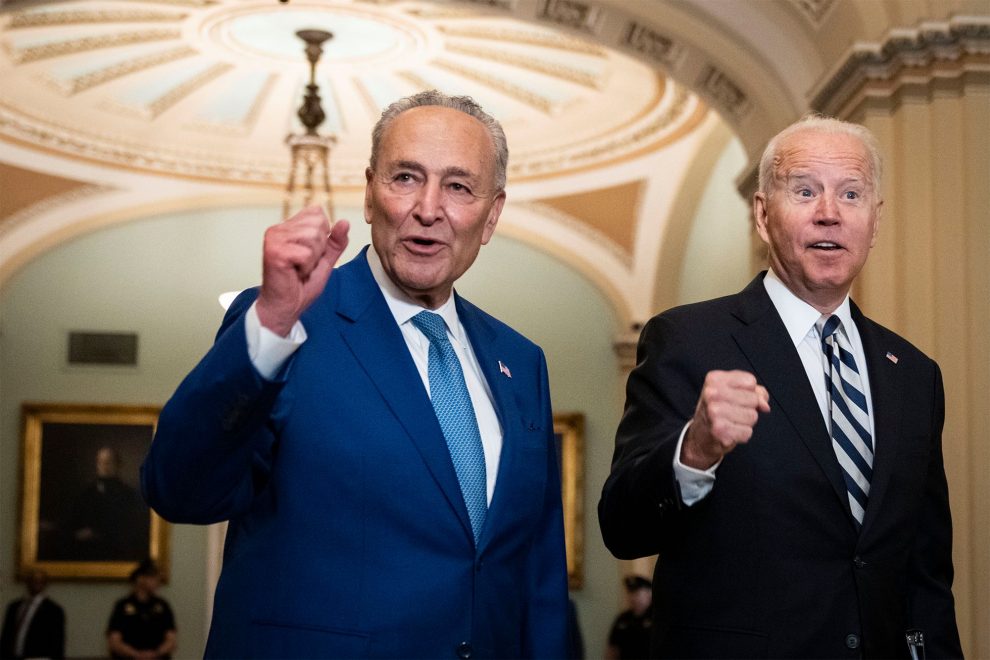There’s a grudging realization among Democrats on the Hill that Joe Biden’s $3.5 trillion “human infrastructure” bill will not pass either the House or Senate without substantial changes. Those changes include dramatically trimming the amount of money to be spent and curtailing the ambitious climate change agenda.
Centrist Democrats in the House want to see concrete measures on how to pay for the bill. Even Joe Biden has said he wants ideas on how to find the revenue to pay for the spending. So far, the Democrats’ proposals for increasing revenue include some form of smoke and mirrors and not much else.
The radicals have dug in their heels and are threatening to blow up not only the $3.5 trillion reconciliation bill if the centrists start whittling away at it, but also the $1 trillion bipartisan infrastructure bill passed by the Senate over the summer. That spending represents the bulk of Joe Biden’s domestic spending agenda.
The bottom line for the centrists is that the bill costs too much and is being rushed in order to satisfy an artificial deadline. But the deadline of September 27 was part of a deal reached with centrists to authorize the House to begin deliberations on the $3.5 trillion plan. Speaker Pelosi promised to bring the bipartisan infrastructure bill to a vote before then so the moderates would be assured there would be no doublecross by the radicals.
Now the radicals are worried that the moderates will refuse to support the “human infrastructure” bill if they don’t pass the bipartisan bill.
It really doesn’t matter because neither side has any idea how to pay for it.
House Ways and Means Committee Chairman Richard Neal (D-Mass.) made an important disclosure Thursday evening when he told reporters that the revenue-raising package coming out his committee will raise well less than what is needed to fully offset Democratic leaders’ official $3.5 trillion spending goal.
Asked if his package of revenue raisers would reach $3.5 trillion, Neal quickly replied: “Oh, no, no. No, that’s not at the moment what we’re talking about.”
The $3.5 trillion reconciliation package won’t pass the Senate in its current form. That much has been made crystal clear by Senators Joe Manchin and Kyrsten Sinema.
WATCH: @Sen_JoeManchin says he will not support the $3.5 trillion plan. pic.twitter.com/tcZW0P8WyF
— Meet the Press (@MeetThePress) September 12, 2021
“We don’t have the need to rush into this and get it done within one week because there’s some deadline we’re meeting or someone’s going to fall through the cracks,” Manchin said on NBC’s “Meet the Press.”
“I want to make sure that children are getting taken care of, that people are basically having an opportunity to go back to work. We have 11 million jobs that we haven’t filled, 8 million people still unemployed. Something’s not matching up there.”
Manchin has said he could support a $1-1.5 trillion reconciliation package. And that’s only if the reconciliation deal maintains a “globally competitive” tax system in the U.S. He’s referring to Biden’s plan to jack up the business tax rate to 28 percent being a deal killer for him.
Bernie Sanders, also appearing on CNN’s “State of the Union,” said that wasn’t “acceptable.”
“No, it is absolutely not acceptable to me,” Sanders said of Manchin’s $1.5 trillion ceiling. Sanders, perhaps the most vocal Senate proponent of a much broader package, said progressives had already compromised enough.
Bernie believes spending $3.5 trillion instead of $6 trillion is a “compromise.” God help the republic.
Story cited here.
























